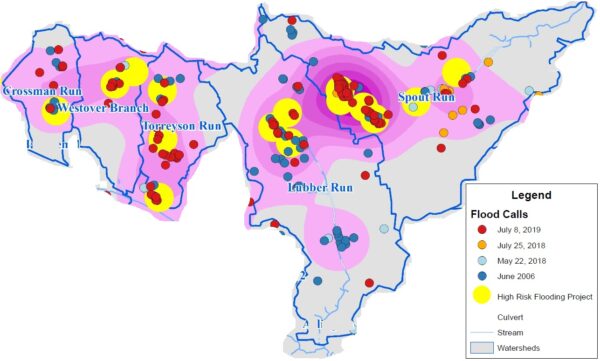
Arlington County is looking to buy homes within the Spout Run watershed for flood mitigation.
Since last fall, the county has notified some three dozen property owners in the Cherrydale and Waverly Hills civic associations by letter of its interest in buying their properties for stormwater management. The letters targeted areas that were hit hard by recent flooding events, like the floods seen in July 2019.
Should they agree to sell, the county would tear down the homes, remove infrastructure such as driveways, and then regrade and replant the land to minimize erosion. Properties would be preserved for open space.
“Phased property acquisition is a necessary component of a resilient stormwater improvement program to provide overland relief and reduce flood risk to the community,” Dept. of Environmental Services spokeswoman Katie O’Brien said. “Voluntary property acquisitions will be targeted to areas in the five critical watersheds at higher risk of flooding due to existing topography.”

The county’s first priority is to create “overland relief,” or a safe path for stormwater to flow during large rain events, per presentation materials on the county’s website. It contends that there is not enough public space to provide those paths or make infrastructure upgrades, and, crucially, that existing stormwater systems were built assuming sufficient overland relief to handle anything stronger than a 10-year storm (which has a 10% chance of happening annually).
“There is not sufficient available space within existing rights-of-way to maintain the infrastructure, make resilient system upgrades, or to provide overland relief,” the presentation says. “There is no long-term solution to reduce flood risk in Spout Run without adding overland relief.”
The solution is a long time in coming for some in the Waverly Hills Civic Association, which — along with the Cherrydale Citizens Association — has met with Arlington County about stormwater management solutions since 2018.
WHCA President Paul Holland says he has heard several residents express frustrations related “to the extended timeline to identify a solution” to the flooding that occured in recent years.
“For the Waverly Hills Civic Association, stormwater issues are our top priority. Our neighbors were dramatically impacted by major flooding events in 2018 and 2019,” he said.
Both Holland and Cherrydale Citizens Association President Jim Todd said several questions remain unanswered, however.
“There was a lot of concern that the county was really, really vague and didn’t seem to know or be willing to share what they intend to do with any of the properties they intend to acquire,” Todd said, adding that he heard from constituents who felt they didn’t get much clarity after calling the county’s real estate office.
Although WHCA members worked with the county to develop an FAQ page addressing many of the questions, they too have outstanding concerns.
“Our primary concern is that the acquired lots will be well designed and taken care of by the County to become usable park land and/or attractive open space as neighborhood amenities,” said Holland.
Todd, however, said he is unsure how the county will be able to create any meaningful overland relief if only a smattering of people sell.
Most of the recipients he says he has heard from are uninterested in selling because they believe flooding on their property hasn’t been all that severe or because of the hard and soft costs of moving, like securing a mortgage at a higher interest rate or changing schools for their kids.
These concerns are echoed in other localities that offer property buyouts for flood prevention, according to a Pew Research Center report, which recommends several ways the federal government can improve participation in local and state programs.
He says his constituents are more keen to see the county invest in comprehensive stormwater management along Langston Blvd as part of the ongoing Plan Langston Blvd initiative. This plan envisions Langston Blvd as a “Green Main Street,” but critics say it relies too much on developers to realize stormwater upgrades.
Arlington is set to spend about $331 million over the next decade, which is a $298 million increase over the last 10-year Capital Improvement Plan, O’Brien said. About two-thirds of the funding is for stormwater capacity improvements and the rest for maintenance capital and water quality projects.
The county has $30 million budgeted for capacity improvement projects and land acquisitions in five critical watersheds over the 2023 and 2024 fiscal years, she said.
“Any ongoing negotiations are confidential,” O’Brien said. “Once an offer is finalized, it will be shared.”

